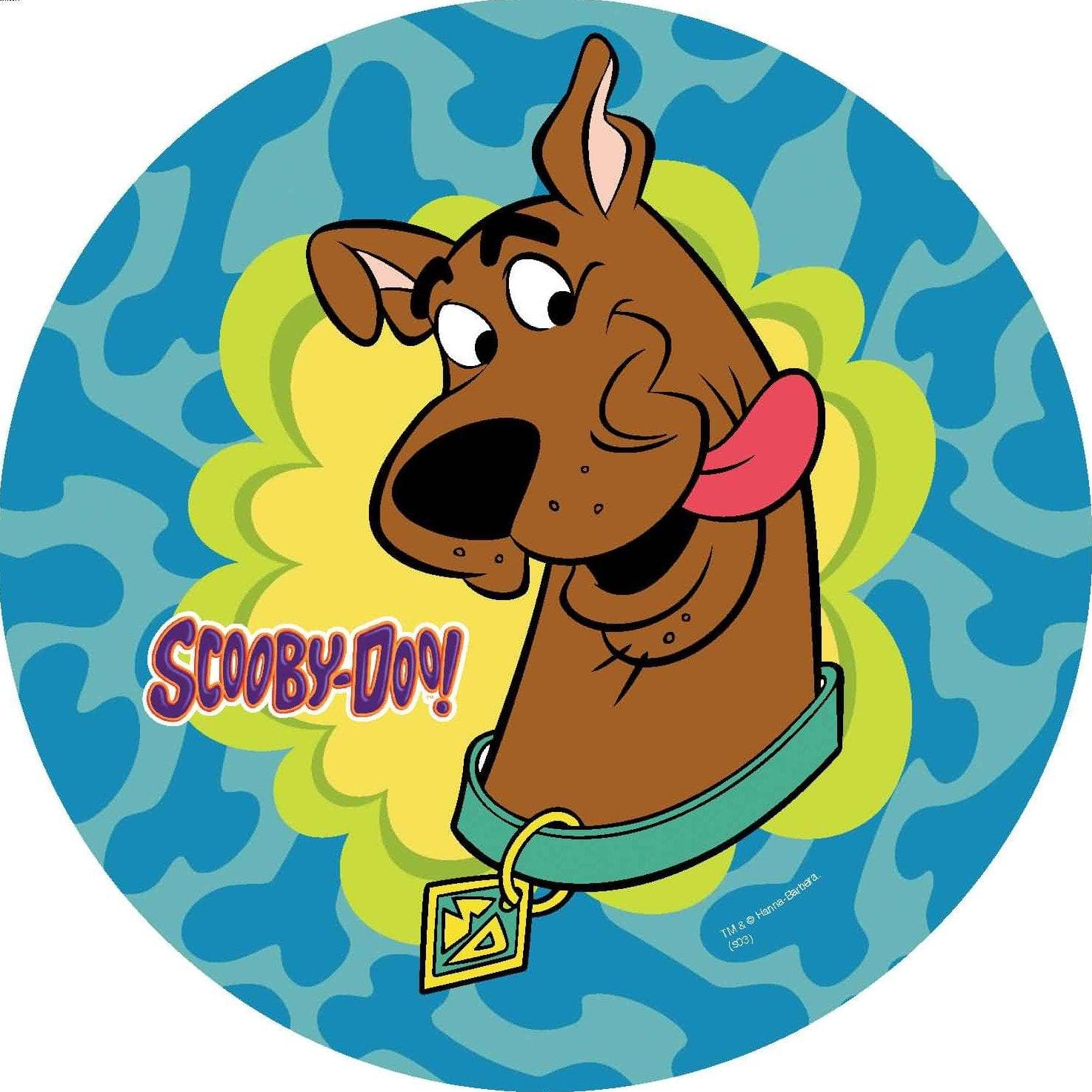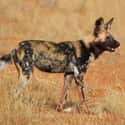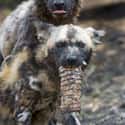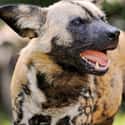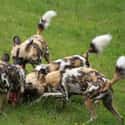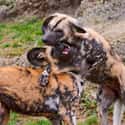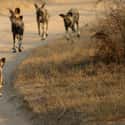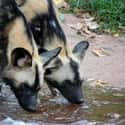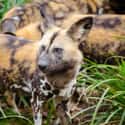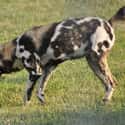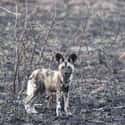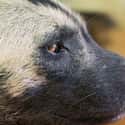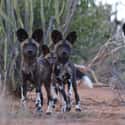-
(#1) African Wild Dogs Are The Definition Of Teamwork
One advantage of sticking together in large groups is the ability to take care of the pack's other members. African wild dogs are one species of mammals that practice respect for their elders and have been observed taking care of the old, injured, and sick members of their group. Although there is only one couple in charge, the pack gets along so well that there is often very little fighting and dogs will follow the dominant pair without issue. Wild dogs will bring food back from the hunt for other members of their pack and regurgitate meals for pups and their mother. In fact, packs are so close knit, every member shares responsibilities, including caring for the young.
-
(#2) They Are Able To Break Human-Made Traps
Although African wild dogs tend to act skittish and anxious when faced with a possible dangerous situation, they are also observing at the same time. Conservationists attempting to encourage more packs to form attempted to capture a breeding pair inside a cage trap. A hunk of meat was hung inside in order to tempt the dogs and they kept their distance until a pair eventually entered and was trapped. The rest of the pack immediately began circling the cage, picked up the rope attached to the door, and pulled it to open the door and free their friends. The dogs' ability to observe the situation before entering and understand how a contraption they had never seen before worked adds intelligence to their list of awesome traits.
-
(#3) They Vote On Group Decisions By Sneezing
Researchers following five different African wild dog packs around the the Moremi Game Reserve discovered a perculiar way packs communicate with one another. When the dogs came together as a group before hunts or moving to a different location, each would often sneeze. Researchers noticed the more sneezes there were, the more often they moved or began their hunt soon after. They reasoned the dogs' sneezes were serving as a voting system, allowing each to contribute their opinion to what the pack did. The dominant pair still had partial control over the pack's decisions, as their sneezes appeared to have greater significance than those of the other dogs. Sneezing as a form of communication has been observed with jackals, coyotes, and domestic dogs in order to display anxiety or excitement, but it has never been seen used for the process of voting.
-
(#4) Packs Hunt Cooperatively With Finely Tuned Choreography
African wild dogs have a nasty reputation partly due to the way they hunt and how efficient of a system it is. They work together in groups and make a cooperative attack where every dog has a role. Remaining organized at all times, the dogs will identify a worthy target, and a team of several dogs will begin the chase. If the first wave of dogs gets tired before the kill, they switch with another team and the chase continues. Using this method, African dogs can run much longer than their prey, which eventually tires and is killed. Although they are fond of hunting antelopes, by working together they can also attack wildebeests or other large prey.
-
(#5) They Have Vocalizations And Rituals To Greet Each Other
Unlike the lone cheetahs and badgers of the world, African wild dogs are extremely social and enjoy hanging out with one another. They can be very talkative as well and communicate with each other through different sounds, including whining, howling, and barking. Tail movement and touching each other with their noses or paws also give signals to each other. African wild dogs have been observed engaging in rituals when they greet one another where they may jump, shake their head, or vocalize their happiness at seeing their friends. Before a hunt, they may also help pump each other up like a sports team before a big game by licking, wagging, and yelping.
-
(#6) Packs Contain Six To Twenty Members And Are Led By Monogamous Breeding Pair
African wild dog packs often contain a lot of members, both in order to better take care of each other and to hunt more efficiently. Packs contain as many as twenty members and each pack is dominated by a couple who breed only with each other. The rest of the pack is made up of other male dogs who do not breed, but occasionally another female will join. She sometimes becomes a pair with another male and they'll create their own offspring while still acting as subordinates. Long ago, wild dogs used to band together in greater numbers and some packs may have contained as many as 40 members. Since becoming endangered, wild dog packs have become much smaller.
-
(#7) The Females Leave To Search For Mates Instead Of The Males
Female African wild dogs are bigger than the males and hold a lot of power within the pack as well as their entire species. In a case of role reversal, the male dogs are often the ones to stay behind to babysit the pups while the female goes hunting with the pack. Females are usually the ones competing for the males when it comes to pairing up to breed rather than males fighting over the females, as seen in other animal groups. When it comes time to form a new pack, it is the females that break away and form their own group. Sometimes they join another pack which has no females. Most male African wild dogs end up staying with their pack for their entire lives, taking care of each generation as it is born and grows up.
-
(#8) Each Wild Dog Has Its Own Unique Coat Pattern Which Helps Other Pack Members Recognize Them
Lycaon pictus is the scientific name of the African wild dog and means "painted wolf." It's a very fitting name since each dog has a pattern of markings that may feature brown, white, black, red, or yellow, and is unique to each individual dog, much like a fingerprint. Since no two dog looks alike, this helps to not only distinguish each from one another, but also helps other dogs easily identify members of their pack. The tails of African wild dogs are very bushy with a bit of white on the tip, which helps them flag each other when using tail signals from a distance, especially while hunting. The patterns and earthy colors the dogs sport also help them camouflage into their surroundings very easily and adds to their effectiveness at capturing their prey.
-
(#9) Researchers Believe Compatibility Play A Part In Pack Formation
African wild dogs tend to stick by their pack even while resting and unlike wolves, wild dogs are rarely seen on their own. Although researchers haven't been able to figure exactly how a group of wild dogs form themselves into a pack, they believe compatibility between the dogs matters. They have observed dogs undertaking a "trial" group that will separate without conflict if things don't work out, as well as separate hierarchies between the males and females of the pack. Because the wild dogs are so non-aggressive towards one another, how dominance is decided among pack members is a mystery as well, although it's possibly based on age. Creating the best possible pack is probably the main motive for the dogs, as having a tight knit group with members able to effectively work together will provide the best life for everyone in the pack.
-
(#10) Wild Dogs Give Birth To Large Litters Which Are Cared For By The Entire Pack
A typical litter for African wild dogs contains about 10 pups but can be as many as 20, which is more than most dogs in the animal kingdom. The babies are usually born in a safe location, such as a hole or thick bush, so they can easily be protected. Hunting members of the pack will bring food back for the pups and the youngest ones get eating priority over everyone else, including the head couple. One reason for the large amount of pups is their high rate of mortality. Pups may be killed by predators, disease, flooding, or a number of other things, and many new pups don't end up surviving long. Since African wild dogs want to keep their numbers up so hunting is easier, nature has insured that at least some will survive thanks to their large litter size.
-
(#11) African Wild Dogs Are Nomadic And Often Travel Over A Very Large Area
The territories of African wild dog covers a wide area and they tend to often move around within their space. They may even call an area as big as 900 square miles their home. To ensure food is plentiful, wild dogs have adopted a nomadic lifestyle. However, during the times pups are born, the pack will stop moving and limit their hunting to a certain area around the den. Requiring such a large area to live has caused the dogs trouble as humans take over more space. Parts of the dogs' area may now contain houses, farms, or roads that cause trouble for both the dogs and the humans.
-
(#12) Endangered African Wild Dogs Are Forced To Stick Together Now More Than Ever
Farmers and ranchers in Africa have considered wild dogs pests for many years. Since human development slowly expands more into the dogs' environment each year, encounters between the two is inevitable. Wild dogs occasionally discover they enjoy eating livestock. Fearing the dogs will destroy their source of income, farmers and ranchers attempt to kill the dogs. Poaching and loss of land due to human development has also affected the wild dogs' numbers. Diseases acquired from domestic animals they encounter, along with rabies, has killed many wild dogs as well. There are now thought to be only as many as 5,000 African wild dogs left in existence, making them the most endangered of all Africa's predators.
New Random Displays Display All By Ranking
About This Tool
African wild dogs are the rarest carnivores in Africa. Because of their powerful hunting skills, African wild dogs are not appreciated by those who try to raise animals. With the reduction of habitat and competition from other large carnivores, their numbers are declining and became endangered. African wild dogs mainly live in the dry grasslands and semi-desert areas of Africa, never activities in dense forests.
The African wild dogs are cooperative hunting animal and live in close groups. It is very rare to have serious fights in the wild dog family. Although they look fierce, they are actually social dogs. The random tool will help you to know more information about African wild dogs.
Our data comes from Ranker, If you want to participate in the ranking of items displayed on this page, please click here.

